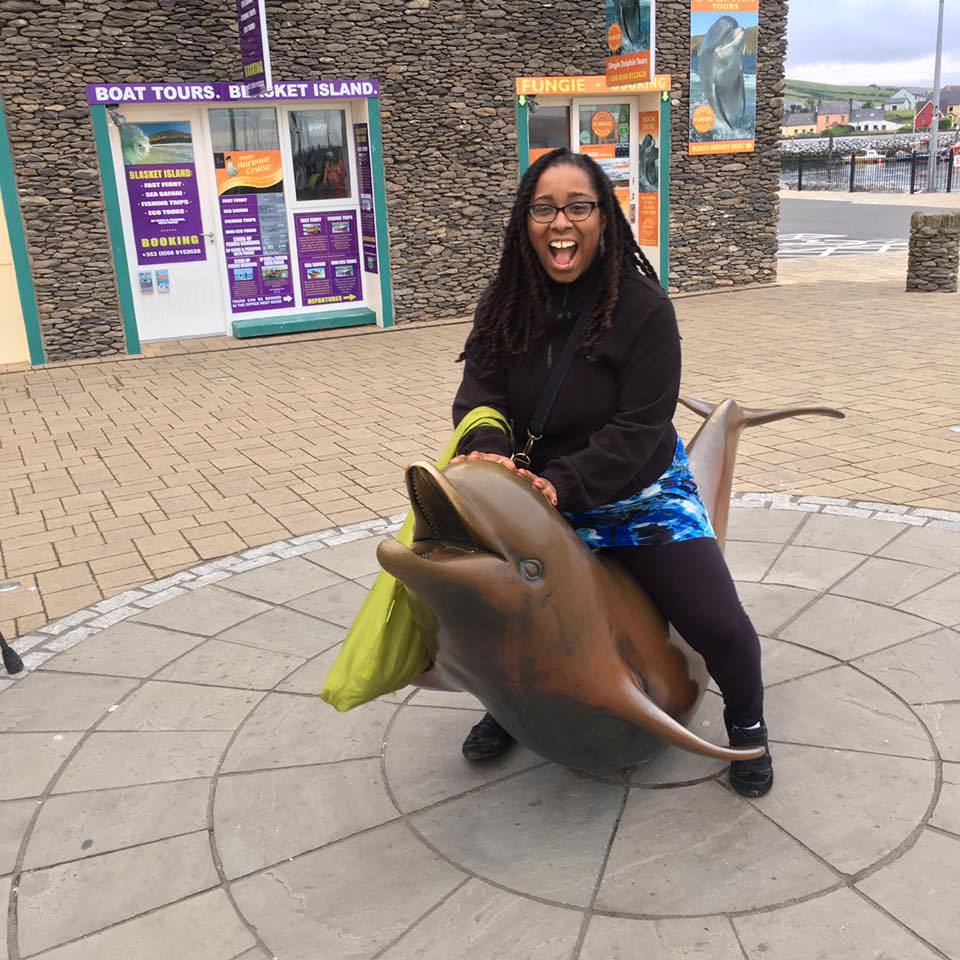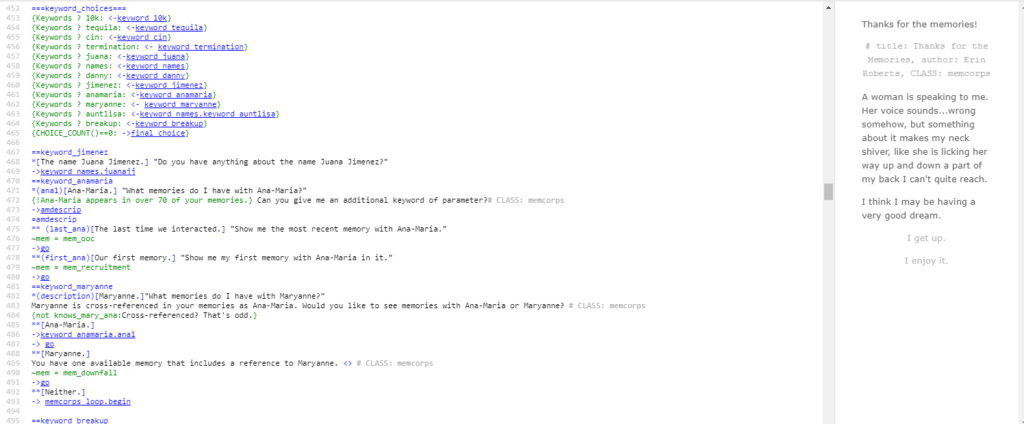
Erin Roberts is a mega-talented author of short stories in the form of speculative fiction, science fiction and long-form narratives. You may have heard of the popular workout app Zombies, Run! Yeah, she’s part of that. She’s also successful with her non-fiction work. She’s a recipient of multiple writing awards and commendations. She has an MFA from the University of Southern Maine. Basically, she’s a badass.
I sat down with her (via Skype) last month for one of the best conversations I’ve ever had. She’s super relatable, down-to-earth and funny. We talked about her panel, How Books Are Fighting Back in the Digital Age, which she is presenting in conjunction with Kate Pullinger, Tea Uglow and Akala. We talked about video games, some of her previous work and even Netflix’s interactive smash hit Bandersnatch.
So first of all, do you want to tell me who you are and what you do? Just as a person.
“I’m Erin, I’m a writer. I write a bunch of different types of things. I think which just one of the reasons that I’m on this panel. I write short fiction. I’m probably most known for writing just regular short, speculative fiction, so science fiction and fantasy short stories. But I also do work for Zombies Run!, which is this audio exercise game, like
You kind of told me already what genre you kind of write for like you write, but what kinds do you prefer to read?
“I mostly write speculative fiction, so sci-fi fantasy horror, and so that’s most of what I read. Like 90 percent of what I read is science fiction, fantasy and horror — which is a large genre, but that’s the majority of it.”
This quote from Thanks For The Memories: “A woman is speaking to me. Her voice sounds…wrong somehow, but something about it makes my neck
“Oh, that’s interesting. So when I originally wrote those lines, I thought of this is sort of a, I’m going to say, more romantic kind of sexual moment, and I remember posting it on Twitter on a “what’s the line from your work in progress?” And everyone was like, ‘That is the creepiest thing I’ve ever read.’ And I was like, ‘Oh, obviously my ideas as to what the emotions are in my own writing, and when other people are students they are wildly off. Like I’m like, ‘Isn’t that kind of like coming out of like a hot dream?’ They’re like, ‘No, it’s creepy.'”

I know we can’t re-create actual memories, but do you think other people’s experiences could ever be bought and sold like in your story?
“I actually think that we could get to a place where that’s possible. I’m very fascinated with memory, and this universe that appears in that story appears in another one of my pieces of short fiction and is in a novel that I’m working on. So I spend a lot of time thinking about how memories and experiences work. And I think a lot of times, if you think about the rise of social media, I think there’s a lot of wanting to be in people’s experiences because it used to be that you could just read about them. Now
What kinds of VR/MR/AR experiences have you had, literature-related or not?
“I haven’t had as many as I would like. Part of that is really because of my vision is not being great, and, so, I have issues with some of the VR things. They don’t work well with my glasses, don’t work the way that they’re meant to. I think some of the very high-end ones do, so when I win the lottery, I will have an amazing VR experience, but I think a lot of my experiences have been more with like either audio stuff that’s just audio, like Zombies, Run! Things that are interactive in a more tech sense and less augmented, less virtual, unfortunately.”
Speaking of, how did you get involved with Zombies, Run?
“Naomi Alderman, who created it, and her team, they wanted to bring in new blood around season six – it’s on season eight now or season eight is being released later this year. And so they actually put out a call for training. All these people applied, including me, and I was accepted. I’m the only one who’s not British.
Are there any roadblocks you foresee that may stall the introduction of these technologies into the book publishing industry?
“I think it’s interesting that I was having a conversation a few months ago with somebody else who works in publishing who is on the agent side, and I was like, ‘What do you think you would think now that we have Kindles and other, you know, places to read books that don’t require the page. Cause that’s your number one thing. So if you wanted to create any sort of augmented experience with a physical book, there are ways to do it.’ There are really interesting books for, like, you turn here and they do things on the page with the way that the words are laid out to make it more interactive. But if you want to add something besides text, obviously it’s going to be difficult if you just have a physical paper book. So a lot of times like it’s like, okay, well how do you get around that? Well now we have digital books, but surprisingly to me, I’m still not seeing a huge influx of people using interactive tools or audio in making books. So we have audiobooks, but I feel like there’s a difference between an audiobook that’s me reading your book and an audiobook that’s you having
Well now we have digital books, but surprisingly to me, I’m still not seeing a huge influx of people using interactive tools or audio in making books.
Erin Roberts
Do you think this technology would invite more people to read? What about
“I think there’s room for everyone. Like there’s a million different ways. It’s kind of like genres. The existence of science fiction doesn’t mean that people who have no interest in it cannot get their own experience reading contemporary fiction or romance. And so I think that it’s just the more ways people have of experiencing the narrative, and at the end of the day what you want people to do is to love narrative. And I think we all do, but humans are natural storytellers. We love to tell stories to each other all the time. That’s how we mostly relate to each other. I think maybe I just think that because I’m a writer. And so I think it’s just about convincing people, but other people telling narratives is interesting. And I think that some people may never pick up a book in its traditional form. But I think sometimes you do get people thinking about the Dragon Age thing. Maybe there are people who are like, ‘I thought of books as being like something really inaccessible that my teacher forced me to do, and I graduated, and I’m like, ‘never again.’ But now I’m really interested in this game, and I’m reading all of the like lore entries and the codex entries in the game, and I’m like, ‘oh, here’s a book about it. I know I already like have bought into this world. I’m interested in these characters. Like now I’m going to read a book about it.” So I think that there are ways in books that actually supports bringing more people into the book world. And then the other way around for people who always love books.
Have you participated in the Netflix sensation of Bandersnatch? Do you think this kind of production helps or hinders your goal?
“The sad thing is I, I started it but have not finished it yet. I have to get back to it. It was interesting. I saw a lot of critique of it and from various circles about its content, but I’m sort of, people are like, it does this. And this, no spoilers, but it does certain things poorly or certain choices that you make. I don’t like the way the game responded to them. And I’m like, ‘that’s cool.’ I just kind of want to see how they did it. And I was really interested in the fact that they use Twine, which is just an open source, interactive fiction tool to actually map out the choices. I mean, then they went and made
“I love the way that it’s gotten people talking. I spend a lot of time, more than I should, probably, on Twitter, and I’ve been seeing a lot of people talk about what makes fiction interactive. I saw an interesting person ask is this interactive fiction? Because it’s choice-based fiction, interactive in the sense that it’s not like you can just, whole cloth, create new paths. You’re choosing from paths that were written, it’s not like you can be controlling the actors and telling them no, like in a live-action role-playing where you can just be like, ‘we’re going to go completely off script,’ like a D&D adventure. I don’t think we’ve yet figured out how to put that in a digital package in a real-time digital package. Where you can just do whatever you want. Like in the Star Trek holodeck where it’s like, ‘now I’ve decided to just murder
A lot of times there’s an interesting tension between what players want, which is, I think, true freedom, sometimes, to just do whatever.
Erin Roberts
A lot of times there’s an interesting tension between what players want, which is, I think, true freedom, sometimes, to just do whatever. If you look at just games in general, open world, I mean
Is there anything else that you want to tell people, get them jazzed about the session or anything else that you just think everybody should know?
“There is a lot more to try. Different pumps. I think that’s the thing that I would say, and even though I don’t even get to try as many of them as I would like, because there’s only so much time in the day, I really do find it really interesting to think about and look at what’s something really interesting that you could be doing. Escape Room, puzzle games, which are an interesting kind of experience. And, probably, the VR game that I’ve played the most in its own weird way is “Keep Talking and Nobody Explodes.” Which is a really cool party game that uses the fact that one person can see something and that you can kind of manipulate it physically in
“I just would say like try different forms, like read an audiobook, listen to something that you might not listen to otherwise, try a new game that you wouldn’t look at otherwise. Read a book, you know, all those different things. I think one of the things
For more information about this subject, please check out the How Books Are Fighting Back in the Digital Age panel on Saturday, March 9 at 12:30 p.m. at the Austin Convention Center, Ballroom F and visit Erin’s website.
